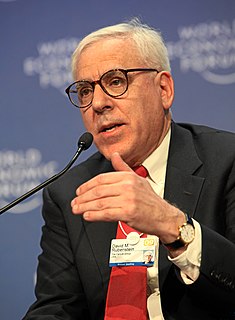A Quote by David Bonderman
The private equity world is a relatively small one. There are currently probably a few thousand professional jobs worldwide. In private equity, that's probably about all there is. So in the scheme of things, the firms are all relatively small.
Related Quotes
Being a good private equity investor is more complicated than it seems. I would say that there are a few characteristics that are important. If you look at the skill set that you need to ultimately be a successful private equity investor, at least at the senior level, you have to be, in this business, a good investor. You have to be able to help companies perform and you have to have judgment around exiting investments. If you look at the skill sets there, they include some things you can teach and some that you can't.
I thought I should try something relatively inexpensive, relatively contained, relatively small. I started working on a feature, a film I'd still like to make: a very talky film of people and ideas about our contemporary state with regard to relationships, marriage, sex, and romance. I started trying to educate myself about filmmaking.
Nobody in my generation ever started out in private equity. We got there by accident. There was no private equity business - actually, the word didn't even exist - when I started. I got there out of the purest of happenstance and so I think many people find what they really enjoy doing just in that way. So another piece of advice for you is: don't worry too much about what you're going to be doing when you get out of business school - life will come your way.
When it comes to gay marriage, the electorate can be broken into three basic groups: a relatively small core of committed opponents; a relatively small core of committed supporters; and a vast swath of conflicted voters who like to think of themselves as 'tolerant,' but who are instinctively uneasy with sudden, sweeping change.
It's actually a relatively small number of people that really are those risk takers, and a relatively small number of people that end up really having an impact on the world, and it doesn't take a lot of people. We said, 'Well, rather than just sit by and wait, or fold our tent and go do something else, let's keep at it. Maybe we can be the ones who can figure this out,' and eventually we were.
































